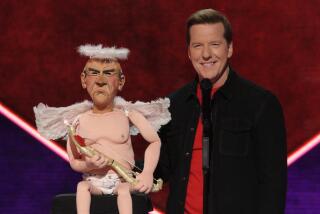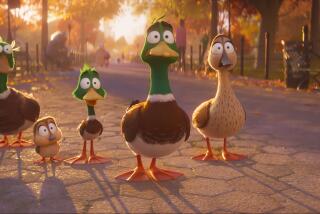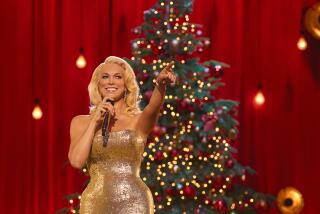The Fuzziest Thing About This ‘Ducky’ Is Its Script
- Share via
Did you hear the one about the ugly duckling?
You will, if you see “Everything’s Ducky,” a very loose musical adaptation of Hans Christian Andersen’s story at La Mirada Theatre.
It’s a bright, boisterous combination of jokes, shtick, ingeniously cartoonish design, digs at contemporary culture, a few excellent musical comedy songs . . . and a convoluted narrative that’s a little too fuzzy around the edges.
The complicated plot ultimately isn’t nearly as important as the other elements, most of which are quite winning for theatergoers in the mood for sophisticated silliness. After all, the books of two other musical fables, “Cats” and “The Lion King,” weren’t their strongest components--and look what happened.
Of course, whatever the merits of their scripts, those shows have stirred the hearts of millions. While “Everything’s Ducky” elicits laughs, it lacks the emotional response that might let it soar over the rest of the flock. A stronger book might make the show’s title more truly descriptive of its effect.
Although its level of wit separates this show from those intended primarily for kids, the story is set up as a girl’s bedtime fantasy, taking place among her barnyard toys. We see the child only as a big puppet peering over the top of the enormous bed headboard that makes up the basic unit of Robert Bissinger’s set. After the prologue, the puppet vanishes, never to return, allowing us to concentrate on what’s going on among the toy animals.
And plenty is going on. The duck dynasty has ruled for 25 years, after carnivores were dethroned when one Big Good Wolf turned against his tyrannical brother, the Big Bad Wolf. Now the king is searching for a mate for his son, Prince Drake (Tony Capone).
An ugly duckling named Serena (Natalie Toro) is thrust into the limelight of the royal party, but her inability to sing prevents her from being taken seriously--except by a suave but purportedly peaceful Wolf (John Herrera), who has strayed into the zone that’s forbidden to his kind, and by the duck’s Aunt Leda (Alicia Irving), an avian godmother.
Seeking a better life in the big city, Serena hitches a ride with a couple of disreputable coyotes who employ her at their strip joint. The Wolf helps her find a better job, working for a fashion czarina (Tracey Conyer Lee); soon, Serena is a supermodel. But a magazine report on her shady past quickly ruins her career. Her Aunt Leda reappears to inspire her anew--and that’s just the first act.
Discussing the second act in detail would give away too much of the ending. But we can say that composer Henry Krieger (“Dreamgirls,” “Side Show”) employs pop idioms well, and lyricist Bill Russell (“Side Show”) occasionally treats the more serious themes with some respect. Serena, the Wolf and the prince perceptively analyze their romantic issues in “I’d Love to Sing a Love Song,” and Drake examines the original story’s moral with warmth and intelligence in “The Beauty Inside.”
More often, however, the book--by Russell and Jeffrey Hatcher--and some of the songs too, serve primarily as a skeleton for the yuks about ducks, models, fashion, television, old-fashioned narrative devices, other musicals, campy gay stereotypes and additional targets. And that skeleton shows occasional signs of fracture.
The story’s coherence isn’t helped by the fact that Toro’s Serena is far from ugly, even in the opening scene--she is, in fact, downright cute--and that her supposed inability to sing is mocked by a powerful set of pipes that are obvious almost from the first scene. Indeed, the effect of her voice when she does sing--on both wolves and other birds--is amplified into a pivotal element of the story, but this element isn’t developed with much consistency.
Consistency is also lacking in the character of the Wolf--which is OK for a while, thanks partially to Herrera’s sharp clowning. But the final twist in the Wolf’s behavior feels insufficiently supported.
The McCoy Rigby production is first-class. Director Gip Hoppe keeps the pace of the satirical references popping (though a couple of the script’s jokes weren’t quite audible on opening night) and uses four stagehands/”facilitators” ingeniously. But as audiences leave this show, they might well cackle about Beaver Bauer’s brilliant costumes as much as anything else. Where else are you going to see what free-range chickens wear when they’re home on the range?
* “Everything’s Ducky,” La Mirada Theatre, 14900 La Mirada Blvd. Tuesdays-Fridays, 8 p.m.; Saturdays, 2:30 and 8 p.m.; Sundays, 2:30 and 7:30 p.m. Ends Dec. 10. $35. (562) 944-9801. Running time: 2 hours, 30 minutes.
“Everything’s Ducky”
Natalie Toro: Serena
John Herrera: Wolf, Mr. Lambkins
Tony Capone: Prince Drake, Major Mule
Alicia Irving: Mrs. Mallard, Aunt Leda, Queen
Tracey Conyer Lee: Mrs. Bovine, Galinda
Mark Chmiel: King, Armand Dillo, Giorgio Grouse, Rooster Bob
Jonathan Brody: Clem Coyote, Sheep, Pig, Free-Range Chicken
Bobby Daye: Carl Coyote, Sheriff Goat, Pig, Free-Range Chicken
Angela Pupello: Mildred Mallard, Daphne, Pig, Verblinka
J.B. Wing: Millicent Mallard, Sally, Wren, Ruta, Guard
Book by Bill Russell and Jeffrey Hatcher. Lyrics by Russell. Music by Henry Krieger. Directed by Gip Hoppe. Choreographed by Linda Goodrich. Costumes by Beaver Bauer. Set by Robert Bissinger. Lighting by Jeff Croiter. Sound by Julie Ferrin. Puppets by Erminio Pinque. Orchestrations by Harold Wheeler. Musical direction by Shawn Gough. Vocal arrangements by David Chase and Gough. Stage manager Kevin Harvey.
More to Read
The biggest entertainment stories
Get our big stories about Hollywood, film, television, music, arts, culture and more right in your inbox as soon as they publish.
You may occasionally receive promotional content from the Los Angeles Times.










